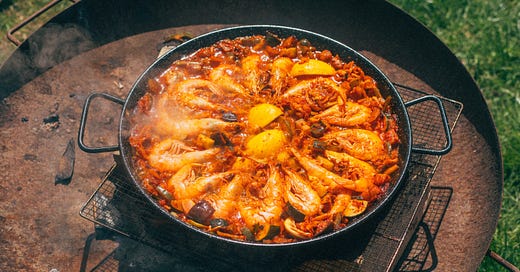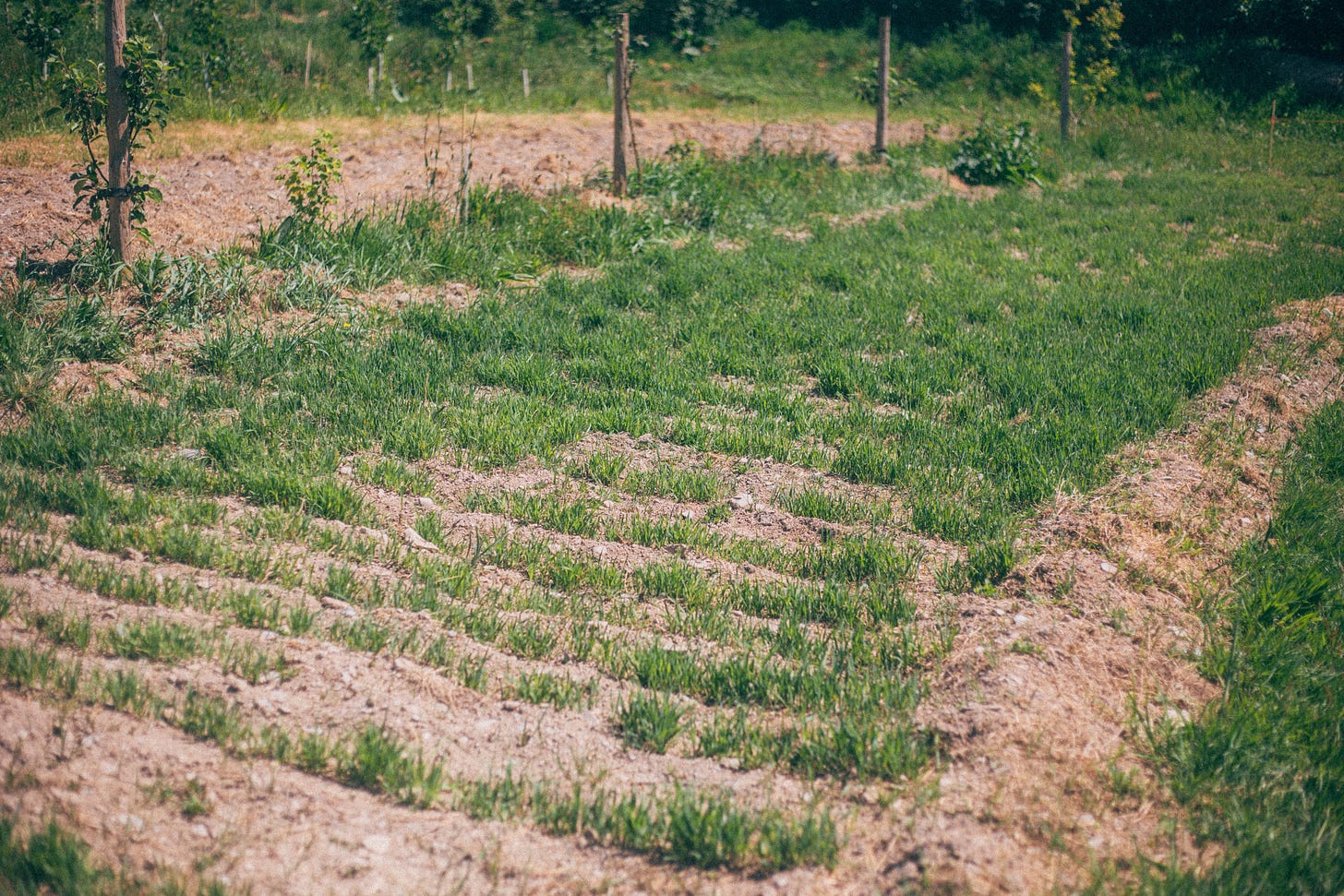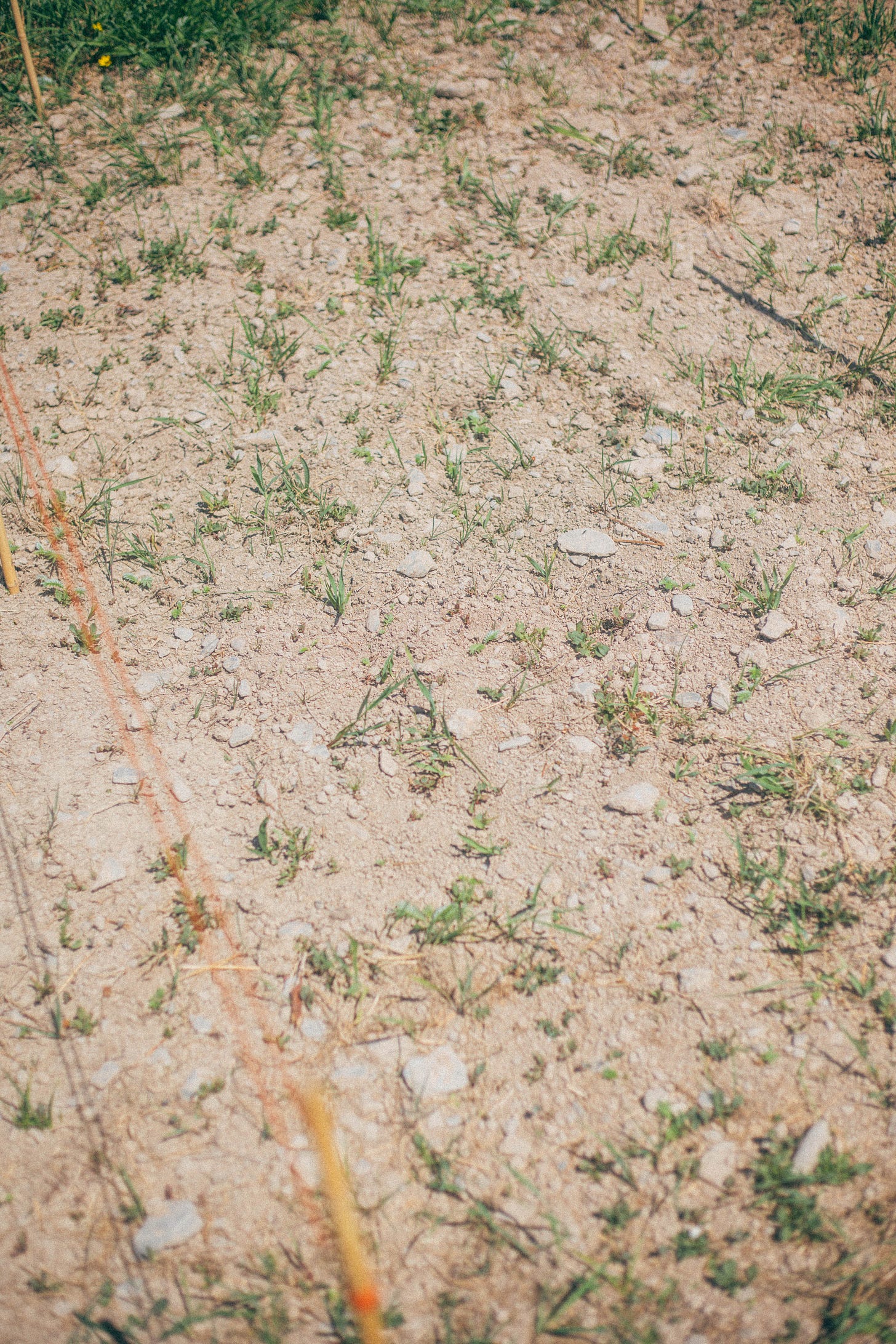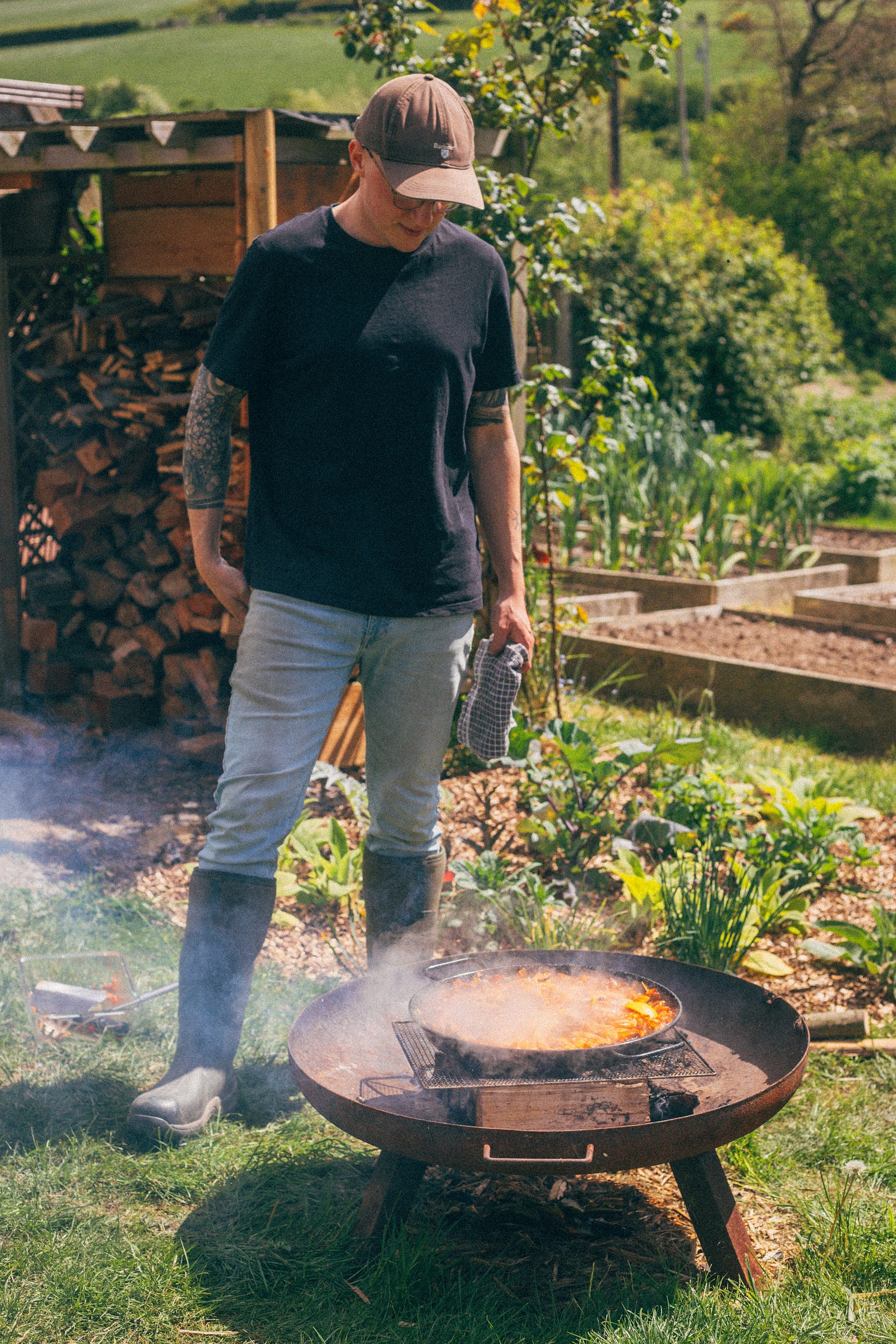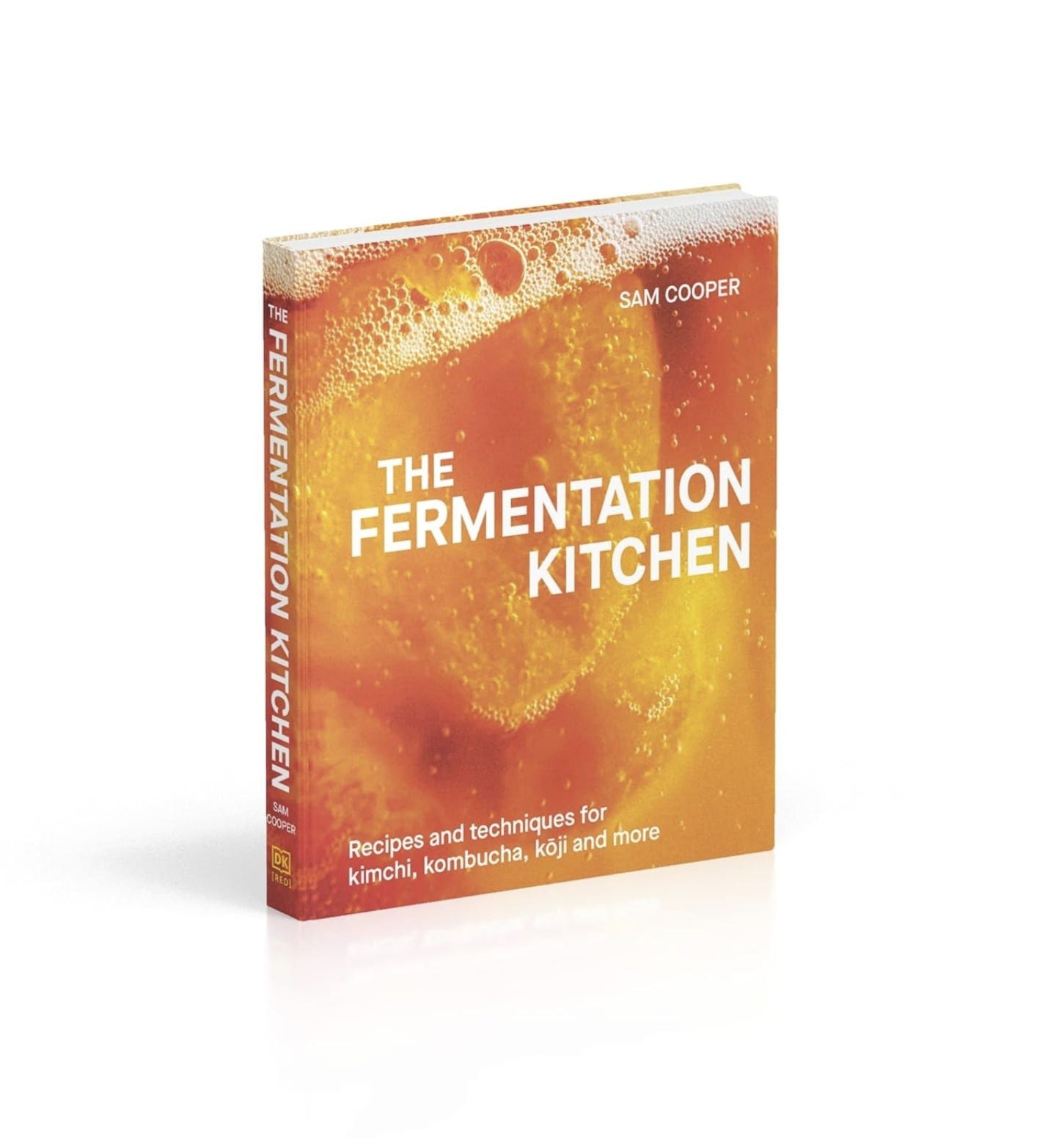Hi everyone,
And a warm welcome back. I’ve been quiet for a couple of weeks whilst I get ahead on a few big projects, both written and R&D in the kitchen (which I’m not allowed to publicly share just yet, but you’ll be the first to know as soon as I can).
Before we jump into this week's newsletter I wanted to say a quick thank you for your patience whilst I’ve been away, especially those of you who support this newsletter as paying members. It’s good to be back.
Updates from the farm
I don’t know about you, but here in Wales it’s been dry. So much so that our off-grid garden at the farm is working overtime to keep up with water storage. Young plants are always the first to tell the truth, rushing to bolt or sulking in a lethargic flop. Over at Felin Ganol, our brilliant local watermill, the millrace has slowed to a trickle and put a stop to all further milling until a storm breaks the heat and fills our rivers.
Now, I don’t mind a bit of sun, especially after a wet Welsh winter, but this dry spell is beginning to bite. Oats in the field are showing signs of golden rust, stressed from the heat at this delicate stage of growth. Pests like wooly aphids and slugs are attacking crops they’d usually leave alone, driven to seek moisture from wherever they can find it. These are the kinds of weather patterns that remind you: we’re not in charge. The land decides.
And while it’s easy to romanticise old machinery and heritage grains (and I often do), there’s nothing quaint about an unpredictable climate when it shows up in a sack of flour.
Still, we do what we’ve always done. We adapt. We shift our expectations. We plant different crops, water wisely, mulch thickly. And when the sun beats down and there’s little else to be done, we light a fire and do some campfire cooking with a beer or two.
And this is the weather for fire food.
Evenings are long and golden, the wind barely moves, smoke keeps the midges away, and cooking outside feels less like a treat and more like the only sensible choice. Flatbreads on a hot stone. Trout baked in wild herbs and clay. Smoked beetroot, charred courgettes, and fermented honey garlic so punchy it makes your lips sing. The flavours that come from fire and smoke and slow heat feel grounding during a time it could be easy to fall to worry.
So here’s a recipe that uses two different fermented foods, a whole lot of veg, and some sweet prawns cooked in the shell.
Campfire Sea Bugs and Kimchi
With Stone Baked Flatbreads
We worked last weekend at the farm, preparing loads of our plants at the nursery for a mass sale (that’s still currently ongoing, more info here) in order to raise funds for the last few bits of infrastructure we need, such as our solar irrigation system (once the rain returns). I decided to treat the team to a campfire lunch and it was Llyr’s first time eating prawns. At first sight he called them sea bugs, but quickly discovered how tasty they are.
If you want to make your own kimchi for it, check out my recipe for baechu kimchi here
Feeds 4–5 generous portions
Stone Baked Flatbreads
Unless you plan to buy them, you’ll want to make these first and keep them to one side.
300g plain flour or strong white bread flour (approx. 2 cups)
1 tsp fine sea salt
½ tsp baking powder (optional, but gives a softer crumb)
2 tbsp yoghurt (plain, any kind)
2 tbsp olive oil or melted butter
150ml warm water (a little more if needed)
Optionals:
A teaspoon of fennel, cumin or nigella seeds
Chopped herbs (thyme, parsley, wild garlic)
In a large bowl, combine the flour, salt and baking powder. Stir in the yoghurt and oil, then gradually add the warm water until it comes together into a soft, kneadable dough. Add a little extra water or flour as needed, the dough should be supple, not sticky.
Knead for a couple of minutes, just to smooth it out, then cover with a cloth or upturned bowl and rest for 20–30 minutes while you get the fire going and heat up a large, smooth stone.
Place a thick, flat stone (or a dry griddle or cast iron pan) beside the fire, not directly in the flames, but close enough to get searing hot. Test it by sprinkling a drop of water on it, it should sizzle instantly.
Divide the dough into 6–8 pieces and roll or pat each into a rough circle or oval, about ½ cm thick. Don’t worry about perfection, rustic suits campfire cooking.
Place each bread on the hot stone and cook for 2–3 minutes on each side, or until puffed and lightly charred. Turn with tongs or a stick if needed, and keep an eye on them. You might need to adjust the stone’s position to keep the heat steady.
When done, brush with melted butter, olive oil, or a little garlic and herb mixture if you fancy. Stack them in a tea towel to keep warm, where the steam will soften them, then move onto making the main dish.
Kimchi Prawns
This is the kind of dish that makes sense of a sunny evening. Cooked low and slow over embers in a big pan, it’s fiery, sweet, and brimming with the smoky tang of good kimchi. No rice here, just plenty of flatbread to mop up every last drop of sauce.
Equipment
A large, flat pan (such as a paella)
A chopping board and knife
A long handled spoon or spatula
Foil (or lid)
Wood and paper
Matches or a lighter
Ingredients
Base:
5 tbsp oil (rapeseed, sunflower or lard)
1 large onion, finely sliced
3 cloves garlic, chopped
Veg & Kimchi:
300g well-fermented kimchi, chopped, plus 2 tbsp of the juice
2 medium courgettes, halved lengthways and sliced
1 red pepper, sliced (optional)
1 aubergine (if you’re reading this from when or where they’re in season)
A few spring onions or wild garlic stems, chopped
A few big handfuls of leafy greens, roughly torn
1-2 lemons, juice and wedges
Sauce & Seasoning:
150ml stock (veg, chicken or fish)
500ml larger
A drizzle of honey or a pinch of sugar (balances the heat)*
A dash of vinegar or squeeze of lemon
* If you have honey fermented garlic, even better.
Seafood:
400g raw prawns, deveined
Extra kimchi juice, if needed
500ml larger
To Serve:
Crusty bread or flatbreads, warm from the fire
Extra lime or lemon wedges
Place your paella (pan) or wide skillet over a steady campfire. Add the oil and wait until it’s hot and shimmering.
Add the onion, garlic and ginger, and fry until softened and just beginning to caramelise.
Add the courgettes, red pepper (if using), aubergine, and chopped kimchi. Stir well and cook for 10 minutes until the veg begins to soften and take on some colour. Splash in the kimchi juice and tamari.
Pour in the stock, beer, and add your drizzle of honey. Simmer for 10–15 minutes, uncovered, letting the flavours deepen and the liquid reduce slightly into a glossy sauce.
Mix in the leafy greens, then place the prawns on top, pushing them down into the bubbling sauce. Squeeze the lemon wedges over the whole thing, then bury the lemons into the sauce too and cover the pan loosely with foil or a lid and cook for another 5–6 minutes until the prawns are pink and the greens have wilted. If it’s looking too dry, add a splash more stock, beer, or kimchi juice.
Bring the pan straight to the fire-side table. Tear up the bread and the shells and dig in while it’s still bubbling.
A Shameless Plug
If you want to find out more about how to ferment all sorts of ingredients using bacteria, yeast, and mould, I wrote a pretty cool book last year called The Fermentation Kitchen that covers a huge range of techniques, ingredients, and uses. If you enjoy this newsletter but want to hold my words, photos, illustrations, and recipes in your own hands, on tasty paper, then you can buy your own copy from anywhere you like to buy books, wherever you are in the world.
Other News
I’ve been thinking about giving this newsletter a bit of a rebrand. I’ve never enjoyed having it named after myself and would rather it reflect the contents of what I write, as well as what our little community here celebrates. I’ve been working hard on the new logo and styling for it, but rest assured, it will always be a place for food (both cooking and growing), recipes, microbes, and thoughts. I’ve always felt as though this newsletter was like writing a seasonal food and fermentation journal that gets published in real time. So, why not treat it like the book I’ll likely never be able to actually publish?
More to come soon.
If you enjoyed this newsletter, feel free to show some support by sharing it wherever you like to share things. It really helps spread the word and give others the gift of rustic recipes and funky ferments. Thank you.
But until then, I hope you have a wonderful week, and thank you for joining me.
Sam


